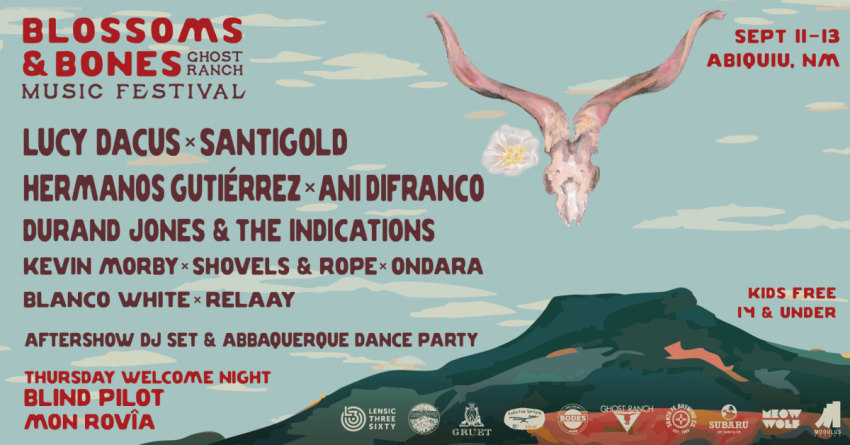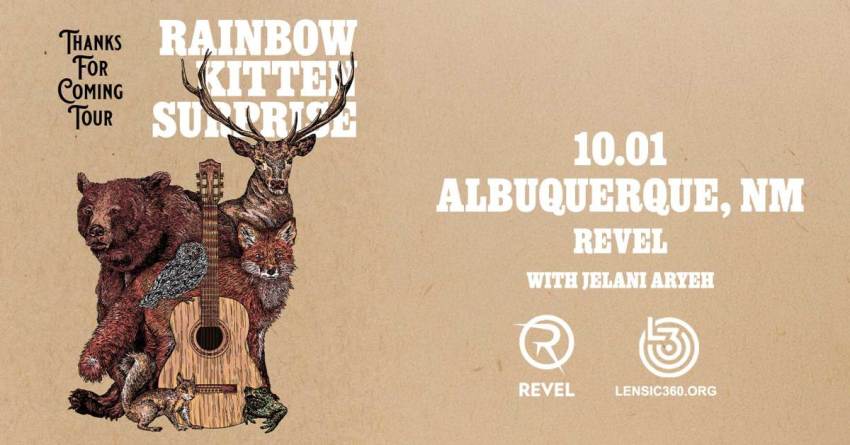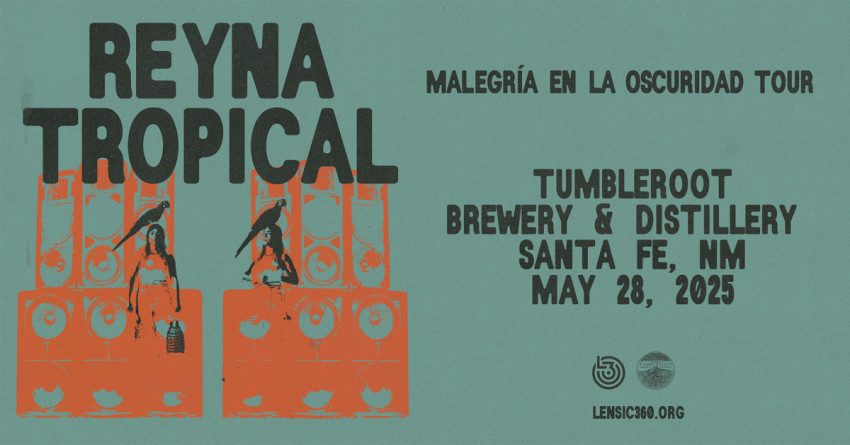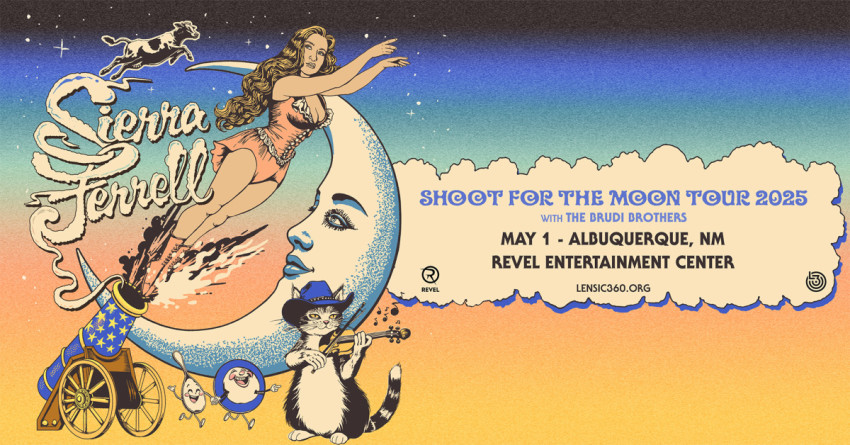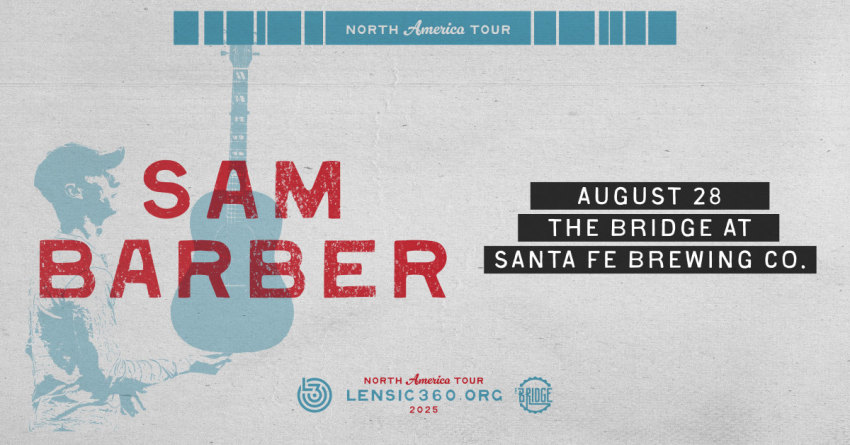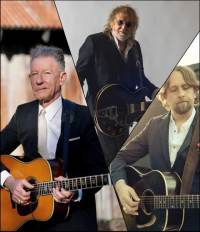

Search
La Luz
April 29thParker Millsap and His band
May 1stSierra Ferrell
May 1stRobyn Hitchcock (Solo)
May 2ndBuzzcocks - SOLD OUT
May 3rdRobyn Hitchcock (Solo)
May 4thJoywave: Here To Perform
May 6thLukas Nelson - SOLD OUT
May 7thSteel Pulse
May 8thAn Evening with The Jayhawks
May 9thRemi Wolf
May 9thAn Evening with The Jayhawks
May 10thYola
May 11thDreamer Isioma
May 12thThe War & Treaty
May 13thMarc Scibilia
May 14thDrew Lynch
May 15thSanta Fe Century 2025
May 17thNightly
May 17thRyan Adams
May 20thRyan Adams
May 21stAhee
May 23rdThe Wrecks
May 27thReyna Tropical
May 28thDope Lemon
May 28thA Conversation with Amy Sedaris
May 30thTrampled by Turtles
May 31stA Conversation with Amy Sedaris
May 31stGreer
May 31stThe War & Treaty
June 2ndFruition
June 3rdDrive-By Truckers & Deer Tick
June 3rdThe Kiffness
June 10thMatteo Mancuso
June 13thPunch Brothers
June 17thPedrito Martínez Group
June 17thThe Travelin' McCourys
June 18thAlison Krauss & Union Station
June 21stLake Street Dive
June 22ndSt. Paul & The Broken Bones
June 23rdCharley Crockett
July 5thRobert Earl Keen w/ Hayes Carll
July 6thDigable Planets w/ The Soul Rebels
July 10thM. Ward & The Undertakers
July 12thMountain Grass Unit
July 15thDave Mason
July 16thThe Psychedelic Furs - SOLD OUT
July 17thMereba
July 17thSurprise Chef
July 19thFather John Misty - SOLD OUT
July 21stTanner Usrey
July 27thBuena Vista Orchestra
July 27thRebirth Brass Band
August 3rdWaxahatchee
August 4thYelawolf
August 7thRosali
August 10thMacy Gray
August 12thModest Mouse
August 23rdTennis
August 24thThe Dead South
August 24thKeb' Mo' and Shawn Colvin - SOLD OUT
August 27thSam Barber
August 28thScott Bradlee's Postmodern Jukebox
August 28thBlossoms & Bones
September 11thThe Swell Season
September 15thFortunate Youth
September 17thKeller Williams' Grateful Grass
September 19thI'm With Her
September 29thThe Waterboys
September 30thRainbow Kitten Surprise
October 1stThe Head and The Heart: Aperture Tour
October 2ndNicotine Dolls
October 21stMurder By Death
November 2ndOsees - SOLD OUT
November 4thRichy Mitch & The Coal Miners
November 5thWilli Carlisle
November 6thThe Brian Jonestown Massacre - SOLD OUT
November 8thJoshua Radin
November 10thLucius
November 12thInfinity Song
November 19thNeko Case
November 21stWelcome To Night Vale: Murder Night in Blood Forest
January 26thAn Evening with the Songwriters Lyle Lovett, Ray Wylie Hubbard & Hayes Carll
Songs & Stories
Add to Cal
TICKETS: $44—$134
Member pre-sale: Wednesday, June 26, 10 am
Public sale: Friday, June 28, 10 am
Want pre-sale access? Become a Lensic member! Learn more here.
ABOUT THE VENUE: Santa Fe Opera
Alcohol: Yes, there are bars all around the venue.
Seating: Yes
Outside Food/Drink: No
Parking: Yes
ADA: Yes
FOR ONLINE CUSTOMER TICKETING sales and support contact support@holdmyticket.com or call 1-877-466-3404.
IN-PERSON WALK-UP SALES ONLY for all shows are available at the Lensic Box Office during Box Office hours.
Special thanks to our presenting sponsor: Edward Jones – Todd White Wealth Management Team
And to Opera Series sponsor: Toyota of Santa Fe
Three iconic Texas musicians come together to share the stage at the stunning Santa Fe Opera for an unforgettable night. The one and only Lyle Lovett is joined by the legendary Ray Wylie Hubbard and one of the Lone Star state's beloved rising stars, Hayes Carll, for a once-in-a-lifetime "guitar pull" style show.
Don't miss an evening of great songs and amusing repartee, all at one of the most beautiful and special venues in the American southwest, the Santa Fe Opera.
LYLE LOVETT
A singer, composer and actor, Lyle Lovett has broadened the definition of American music in a career that spans 14 albums. Coupled with his gift for storytelling, the Texas-based musician fuses elements of country, swing, jazz, folk, gospel and blues in a convention-defying manner that breaks down barriers.
Whether touring as a 'Duo' or with his 'Acoustic Group' or his 'Large Band,' Lovett's live performances show not only the breadth of this Texas legend's deep talents, but also the diversity of his influences, making him one of the most compelling and captivating musicians in popular music.
Since his self-titled debut in 1986, Lyle Lovett has evolved into one of music's most vibrant and iconic performers. Among his many accolades, besides the four Grammy Awards, he was given the Americana Music Association's inaugural Trailblazer Award, and was named Texas State Musician.
His works, rich and eclectic, are some of the most beloved of any artist working today.
RAY WYLIE HUBBARD
When F. Scott Fitzgerald issued his classic conclusion that ‘There are no second acts in American lives,’ he failed to envision the career of legendary Texas troubadour Ray Wylie Hubbard. A willing conspirator in the late seventies Cosmic Cowboy revolt that ushered in the mythical Outlaw era, Hubbard was a catalyst in the cultural upheaval that led to the peaceful coexistence of Lone Star music enthusiasts who comprised each end of the social and political spectrum of that troubled time. In the stellar company of iconic colleagues like Willie Nelson, Waylon Jennings, Doug Sahm and Jerry Jeff Walker, Ray Wylie Hubbard was an architect of the musical legacy that continues to inspire subsequent generations of up-and-coming Texas talent.
Yes, Hubbard is a Texas singer-songwriter, complete with the classic trifurcated handle, fundamental chapter of the canon in his song catalog ("Redneck Mother"), and enough wild hairs in his past to qualify him as a legend. But along the way, his attention began to leave matters extraneous to his art and soul by the wayside and focus on the beauty and potential to be found in the blank canvas of, in his case, the yet to be written and recorded song. The result has been one of the most satisfying musical and lyrical journeys to witness over the last two decades. In the years that followed he evolved into a writer of uncommonly honest portraits of life, alternately mixing deep personal sagas with poignant character studies of those traveling on the dark side of the road.
If one wanted to describe the sound of Ray Wylie Hubbard, one could call it American music, born from the time honored traditions of folk, country, and roots rock.
HAYES CARLL
The country simplicity that imbues Hayes Carll’s songs can sometimes hide the social conscience and sharp humor that also runs through them, but if you want to find those things, they are there. In fact, Carll has spent over 20 years having a conversation about what it is we’re all doing here with anyone who will listen. He makes us laugh––but then he makes us cry. We judge a song’s protagonist, only for Carll to spin us around to commiserate with them.
“I like to tug at heartstrings, find commonality with others, reflect on my own life, and sometimes I do it in a lighthearted way,” says Carll. “A lot of musical styles found their way onto this record, but my first and most formative influences came from country music. This is a country singer-songwriter record. It’s just unapologetically me.”
Carll is talking about You Get It All, his eighth album. His voice, rich but worn, has never sounded better. As a songwriter, he is in top form, turning droll confessions, messy relationships, motel room respites, and an exasperated, hitchhiking God into modern nuggets.
The New York Times likened Carll’s ability to undergird humor with a weightier narrative to Bob Dylan. When Carll talks about the sounds that are in his own head, he mentions Randy Travis. That juxtaposition defines the singularity of Carll’s career: He exists in a
space of his own, informed by John Prine, Tom Waits, and Dylan but also by Travis, Kenny Rogers, and Hank Williams, Jr.
Those influences may have made him hard to pigeonhole, but he’s still been embraced. Two Americana Music Awards, a Grammy nomination for Best Country Song, and multiple Austin Music Awards line his resumé́. He’s had the most-played record on Americana radio twice. His songs appear on the screen regularly and have been recorded by Kenny Chesney, Lee Ann Womack, and Brothers Osborne, to name a few.
You Get It All was produced by Allison Moorer and guitar legend Kenny Greenberg. Carll credits his partnership with singer, songwriter, and artist Moorer, his wife, as a force that helps both clarify what he wants and challenge self-imposed limits. “She’s a world-class
artist who has a way of helping me articulate my vision,” he says.
Opener “Nice Things” layers a laugh-out-loud narrative exposing humanity’s botched stewardship of Earth––and one another––over vintage country cool. In the song written with the Brothers Osborne, God comes down to check on us––and she is not impressed. “It’s social commentary, but it’s not dour,” Carll says. “I hope the song can make people
sing along, laugh a bit, and maybe recognize that we can do better.”
The title track is classic Carll—a front-porch singalong with a deeper message for those who want it. Self-deprecating and sweet, the song is an ode to bringing one’s whole self to a relationship––the good and the bad. “I’m at a point in my life where that rings true to me,” says Carll. “What I want, and what I think a lot of people want, is to feel like they’re getting the real thing.”
“Help Me Remember” is a feat of storytelling that tackles an underrepresented topic in art: dementia from the perspective of the patient. “It’s a visual song. To tell this story, we had to put the listener right there,” Carll says. “I was thinking about how scary and sad it is for the person who is suffering from it, and how heartbreaking and frustrating it is for the friends and family going through it with them.”
Among Carll’s co-writers is singer-songwriter Brandy Clark, who helped him pen and
perform “In the Mean Time,” a gorgeous, honky-tonk waltz which perfectly depicts the damage couples can inflict on each other when they’re at their worst. The multi- dimensionality of relationships is a thread woven throughout the entire album. “When we’re our weakest or most afraid, real damage can be done to our relationships, as well as our spirits,” says Carll. “You can love somebody, everything can be as good as you could’ve imagined, but when your traumas or fears come out, all that love can disappear in an instant.”
Rollicking through snarling 80s country guitar licks, “To Keep From Being Found” is an escape to a motel room with a TV on wheels, a bath, and line after delectable line. Subdued album closer “If It Was Up to Me” aches through a list of wishes that seem frivolous at first but build into a portrait of pain that’s far more complicated. Written with Moorer and Sean McConnell, it’s a gorgeous example of one of Carll’s favorite artistic devices: leading listeners to underestimate a character with whom they’ll ultimately empathize. “The way humor and sadness can work together is powerful,” he says.
Honest and sometimes subversive, but never mean-spirited, Carll keeps writing sad, funny, compelling songs in which nobody’s perfect or predictable––at least not for long. And he can’t quit wishing we’ll all realize that’s the way anything worth having or being has got to go. “I hope this record helps people feel good, laugh a bit, and maybe give them something to lean on when they need it,” he says. “I hope they dance to it, too.”



